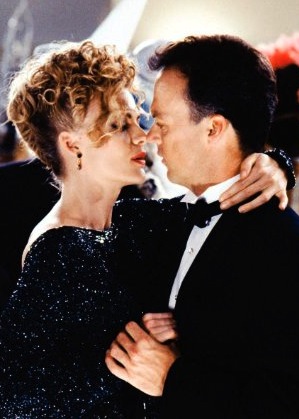Friday, June 19, 1992
BATMAN RETURNS. Written by Daniel Waters and Sam Hamm; based on characters created by Bob Kane. Music by Danny Elfman. Directed by Tim Burton. Running time: 126 minutes. Rated 14 Years Limited Admission with the B.C. Classifier's warning: some violence, occasional suggestive language.
QUESTIONS, QUESTIONS, QUESTIONS.
Batman Returns offers elegant refinements on the knight vision filmgoers so fervently embraced in 1989's Batman. Though director Tim Burton's second visit to Gotham City contains fewer surprises, it delivers the same intense combination of black comedy and overstated psycho-drama.
And questions.
"Must you be the only lonely man-beast in town?" butler Alfred Pennyworth (Michael Gough) asks a brooding Bruce Wayne (Michael Keaton).
"You've got sort of a dark side, don'tcha?" Wayne later asks attractive, aggressively flirtatious Selina Kyle (Michelle Pfeiffer).
"Was Vicki right about your difficulty with duality?" Selina asks the wealthy socialite during another meeting.
Why is it that this season's toy movies — adventure fantasies like Alien3 and Batman Returns — are darker, more despairing and more implicitly critical of the status quo than conventional dramatic fare?
One answer to that last question is that Steven Spielberg spoiled us. The ET director's positive, When-You-Wish-Upon-a-Star worldview made fantasy synonymous with feel-good film-making.
Burton sees things differently. Like a manic-depressive teenager, the former Disney animator has moved past the cuckoo-clock cuteness of the nursery to to explore life's Grimm subtexts.
In a recent interview, Burton said that his interest is in uncovering the post-Freudian reality of cartoon characters found in "a new generation of comic books that explores their psychology and complexities, and not how square their jaw is."
There is, for example, Batman's duality. In the alternate reality of Gotham City, a wealthy orphan can patrol the mean streets as a high-tech vigilante. A costumed crime-fighter, he calls himself Batman.
And he's nuts.
Yes, our hero is mad, driven to extremes by a need for revenge. But then, so is his world and almost everyone in it.
As Bruce Wayne, he associates with the power-mad entrepreneur Max Shreck (Christopher Walken), a man who presents himself as a public benefactor. As Wayne, he is attracted to Selina, Shreck's pretty assistant, whose "dark side" is the whip-wielding Catwoman.
As Batman, he's locked in mortal combat with "man-beast" Oswald Cobblepot, the deformed, sewer-dwelling master criminal known as the Penguin (Danny DeVito). "I'm a genuine freak," the villain hisses at him. "You're only wearing a mask!"
A stylish tale of self-aware psychopaths, Batman Returns is entertainment for a generation that has lost faith in its future. Catwoman (described by actress Pfeiffer as "possessing a kind of rage that is not historically considered a feminine quality, but one that many women have") is the character who says it best.
"It's the normal guys who always let you down," she purrs to her conflicted bat-guy. "Sickos never scare me. At least they're committed."
Burton, as committed as his characters, delivers a picture that's different from, and better than, the unending promotional hype. His Batman Returns is dark myth for depressed times.
The above is a restored version of a Province review by Michael Walsh originally published in 1992. For additional information on this archived material, please visit my FAQ.
Afterword: For me, one of the all-time great movie moments is the scene in Batman Returns in which Selina Kyle, costumed and fully accepting of her role as Catwoman, backflips into a confrontation between Batman and The Penguin. Dismissive of their posturing, she sums up her hard-won sense of personal empowerment in a single word: Meow! At that moment, a dam broke in the popular culture. A year earlier, the hit Thelma and Louise (1991) put the issue of female rage front and centre, then copped out with a Butch and Sundance ending. In Batman Returns, Catwoman not only has all the best lines, but survives with her anger intact to fight another day. An argument can be made that Tim Burton paved the way for Joss Whedon and his game-changing Buffy the Vampire Slayer. The idea of women's rage that Pfieffer identified in a 1992 Los Angeles Times interview is an important component of at least two of my current favourite television series, each just days away from their 2014-2015 season finales. On Grimm, the dark-fantasy cop show set in Portland, hero Nick Burkhardt's faithful girlfriend Juliette (Bitsie Tulloch) has gained the powers of a Hexenbiest. The transformation has released the still waters of her long-simmering rage, and equipped her with the ability to take control: a meow! moment. On Gotham, the steampunky prequel inspired by the enduring popularity of the Batman characters, Selina Kyle is introduced as a 13-year-old inner-city street kid who witnesses the murder of 12-year-old Bruce Wayne's parents. Played by 15-year-old Camren Bicondova, the pre-Catwoman Selina is one of the most compelling characters on the intense new series, an angry young woman who is imparting important survival skills to a pre-Batman Bruce.
